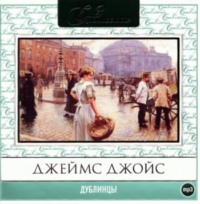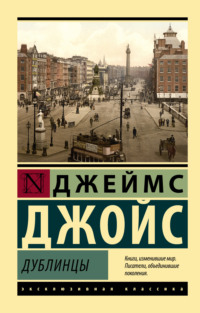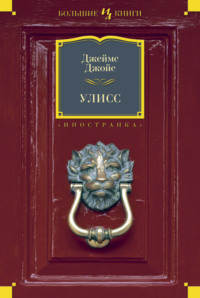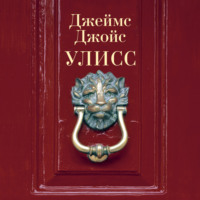
Полная версия
The Dead
“O, Mr Conroy, will you come for an excursion to the Aran Isles this summer? We're going to stay there a whole month. It will be splendid out in the Atlantic. You ought to come. Mr Clancy is coming, and Mr Kilkelly and Kathleen Kearney. It would be splendid for Gretta too if she'd come. She's from Connacht, isn't she?”
“Her people are,” said Gabriel shortly.
“But you will come, won't you?” said Miss Ivors, laying her warm hand eagerly on his arm.
“The fact is,” said Gabriel, “I have just arranged to go-”
“Go where?” asked Miss Ivors.
“Well, you know, every year I go for a cycling tour with some fellows and so-”
“But where?” asked Miss Ivors.
“Well, we usually go to France or Belgium or perhaps Germany,” said Gabriel awkwardly.
“And why do you go to France and Belgium,” said Miss Ivors, “instead of visiting your own land?”
“Well,” said Gabriel, “it's partly to keep in touch with the languages and partly for a change.”
“And haven't you your own language to keep in touch with-Irish?” asked Miss Ivors.
“Well,” said Gabriel, “if it comes to that, you know, Irish is not my language.”
Their neighbours had turned to listen to the cross-examination. Gabriel glanced right and left nervously and tried to keep his good humour under the ordeal which was making a blush invade his forehead.
“And haven't you your own land to visit,” continued Miss Ivors, “that you know nothing of, your own people, and your own country?”
“O, to tell you the truth,” retorted Gabriel suddenly, “I'm sick of my own country, sick of it!”
“Why?” asked Miss Ivors.
Gabriel did not answer for his retort had heated him.
“Why?” repeated Miss Ivors.
They had to go visiting together and, as he had not answered her, Miss Ivors said warmly:
“Of course, you've no answer.”
Gabriel tried to cover his agitation by taking part in the dance with great energy. He avoided her eyes for he had seen a sour expression on her face. But when they met in the long chain he was surprised to feel his hand firmly pressed. She looked at him from under her brows for a moment quizzically until he smiled. Then, just as the chain was about to start again, she stood on tiptoe and whispered into his ear:
“West Briton!”
When the lancers were over Gabriel went away to a remote corner of the room where Freddy Malins' mother was sitting. She was a stout feeble old woman with white hair. Her voice had a catch in it like her son's and she stuttered slightly. She had been told that Freddy had come and that he was nearly all right. Gabriel asked her whether she had had a good crossing. She lived with her married daughter in Glasgow and came to Dublin on a visit once a year. She answered placidly that she had had a beautiful crossing and that the captain had been most attentive to her. She spoke also of the beautiful house her daughter kept in Glasgow, and of all the friends they had there. While her tongue rambled on Gabriel tried to banish from his mind all memory of the unpleasant incident with Miss Ivors. Of course the girl or woman, or whatever she was, was an enthusiast but there was a time for all things. Perhaps he ought not to have answered her like that. But she had no right to call him a West Briton before people, even in joke. She had tried to make him ridiculous before people, heckling him and staring at him with her rabbit's eyes.
He saw his wife making her way towards him through the waltzing couples. When she reached him she said into his ear:
“Gabriel, Aunt Kate wants to know won't you carve the goose as usual. Miss Daly will carve the ham and I'll do the pudding.”
“All right,” said Gabriel.
“She's sending in the younger ones first as soon as this waltz is over so that we'll have the table to ourselves.”
“Were you dancing?” asked Gabriel.
“Of course I was. Didn't you see me? What row had you with Molly Ivors?”
“No row. Why? Did she say so?”
“Something like that. I'm trying to get that Mr D'Arcy to sing. He's full of conceit, I think.”
“There was no row,” said Gabriel moodily, “only she wanted me to go for a trip to the west of Ireland and I said I wouldn't.”
His wife clasped her hands excitedly and gave a little jump.
“O, do go, Gabriel,” she cried. “I'd love to see Galway again.”
“You can go if you like,” said Gabriel coldly.
She looked at him for a moment, then turned to Mrs Malins and said:
“There's a nice husband for you, Mrs Malins.”
While she was threading her way back across the room Mrs Malins, without adverting to the interruption, went on to tell Gabriel what beautiful places there were in Scotland and beautiful scenery. Her son-in-law brought them every year to the lakes and they used to go fishing. Her son-in-law was a splendid fisher. One day he caught a beautiful big fish and the man in the hotel cooked it for their dinner.
Gabriel hardly heard what she said. Now that supper was coming near he began to think again about his speech and about the quotation. When he saw Freddy Malins coming across the room to visit his mother Gabriel left the chair free for him and retired into the embrasure of the window. The room had already cleared and from the back room came the clatter of plates and knives. Those who still remained in the drawing-room seemed tired of dancing and were conversing quietly in little groups. Gabriel's warm trembling fingers tapped the cold pane of the window. How cool it must be outside! How pleasant it would be to walk out alone, first along by the river and then through the park! The snow would be lying on the branches of the trees and forming a bright cap on the top of the Wellington Monument. How much more pleasant it would be there than at the supper-table!
He ran over the headings of his speech: Irish hospitality, sad memories, the Three Graces, Paris, the quotation from Browning. He repeated to himself a phrase he had written in his review: “One feels that one is listening to a thought-tormented music.” Miss Ivors had praised the review. Was she sincere? Had she really any life of her own behind all her propagandism? There had never been any ill-feeling between them until that night. It unnerved him to think that she would be at the supper-table, looking up at him while he spoke with her critical quizzing eyes. Perhaps she would not be sorry to see him fail in his speech. An idea came into his mind and gave him courage. He would say, alluding to Aunt Kate and Aunt Julia: “Ladies and Gentlemen, the generation which is now on the wane among us may have had its faults but for my part I think it had certain qualities of hospitality, of humour, of humanity, which the new and very serious and hypereducated generation that is growing up around us seems to me to lack.” Very good: that was one for Miss Ivors. What did he care that his aunts were only two ignorant old women?
A murmur in the room attracted his attention. Mr Browne was advancing from the door, gallantly escorting Aunt Julia, who leaned upon his arm, smiling and hanging her head. An irregular musketry of applause escorted her also as far as the piano and then, as Mary Jane seated herself on the stool, and Aunt Julia, no longer smiling, half turned so as to pitch her voice fairly into the room, gradually ceased. Gabriel recognised the prelude. It was that of an old song of Aunt Julia's-Arrayed for the Bridal. Her voice, strong and clear in tone, attacked with great spirit the runs which embellish the air and though she sang very rapidly she did not miss even the smallest of the grace notes. To follow the voice, without looking at the singer's face, was to feel and share the excitement of swift and secure flight. Gabriel applauded loudly with all the others at the close of the song and loud applause was borne in from the invisible supper-table. It sounded so genuine that a little colour struggled into Aunt Julia's face as she bent to replace in the music-stand the old leather-bound songbook that had her initials on the cover. Freddy Malins, who had listened with his head perched sideways to hear her better, was still applauding when everyone else had ceased and talking animatedly to his mother who nodded her head gravely and slowly in acquiescence. At last, when he could clap no more, he stood up suddenly and hurried across the room to Aunt Julia whose hand he seized and held in both his hands, shaking it when words failed him or the catch in his voice proved too much for him.
“I was just telling my mother,” he said, “I never heard you sing so well, never. No, I never heard your voice so good as it is tonight. Now! Would you believe that now? That's the truth. Upon my word and honour that's the truth. I never heard your voice sound so fresh and so… so clear and fresh, never.”
Aunt Julia smiled broadly and murmured something about compliments as she released her hand from his grasp. Mr Browne extended his open hand towards her and said to those who were near him in the manner of a showman introducing a prodigy to an audience:
“Miss Julia Morkan, my latest discovery!”
He was laughing very heartily at this himself when Freddy Malins turned to him and said:
“Well, Browne, if you're serious you might make a worse discovery. All I can say is I never heard her sing half so well as long as I am coming here. And that's the honest truth.”
“Neither did I,” said Mr Browne. “I think her voice has greatly improved.”
Aunt Julia shrugged her shoulders and said with meek pride:
“Thirty years ago I hadn't a bad voice as voices go.”
“I often told Julia,” said Aunt Kate emphatically, “that she was simply thrown away in that choir. But she never would be said by me.”
She turned as if to appeal to the good sense of the others against a refractory child while Aunt Julia gazed in front of her, a vague smile of reminiscence playing on her face.
“No,” continued Aunt Kate, “she wouldn't be said or led by anyone, slaving there in that choir night and day, night and day. Six o'clock on Christmas morning! And all for what?”
“Well, isn't it for the honour of God, Aunt Kate?” asked Mary Jane, twisting round on the piano-stool and smiling.
Aunt Kate turned fiercely on her niece and said:
“I know all about the honour of God, Mary Jane, but I think it's not at all honourable for the pope to turn out the women out of the choirs that have slaved there all their lives and put little whipper-snappers of boys over their heads. I suppose it is for the good of the Church if the pope does it. But it's not just, Mary Jane, and it's not right.”
She had worked herself into a passion and would have continued in defence of her sister for it was a sore subject with her but Mary Jane, seeing that all the dancers had come back, intervened pacifically:
“Now, Aunt Kate, you're giving scandal to Mr Browne who is of the other persuasion.”
Aunt Kate turned to Mr Browne, who was grinning at this allusion to his religion, and said hastily:
“O, I don't question the pope's being right. I'm only a stupid old woman and I wouldn't presume to do such a thing. But there's such a thing as common everyday politeness and gratitude. And if I were in Julia's place I'd tell that Father Healey straight up to his face…”
“And besides, Aunt Kate,” said Mary Jane, “we really are all hungry and when we are hungry we are all very quarrelsome.”
“And when we are thirsty we are also quarrelsome,” added Mr Browne.
“So that we had better go to supper,” said Mary Jane, “and finish the discussion afterwards.”
On the landing outside the drawing-room Gabriel found his wife and Mary Jane trying to persuade Miss Ivors to stay for supper. But Miss Ivors, who had put on her hat and was buttoning her cloak, would not stay. She did not feel in the least hungry and she had already overstayed her time.
“But only for ten minutes, Molly,” said Mrs Conroy. “That won't delay you.”
“To take a pick itself,” said Mary Jane, “after all your dancing.”
“I really couldn't,” said Miss Ivors.
“I am afraid you didn't enjoy yourself at all,” said Mary Jane hopelessly.
“Ever so much, I assure you,” said Miss Ivors, “but you really must let me run off now.”
“But how can you get home?” asked Mrs Conroy.
“O, it's only two steps up the quay.”
Gabriel hesitated a moment and said:
“If you will allow me, Miss Ivors, I'll see you home if you are really obliged to go.”
But Miss Ivors broke away from them.
“I won't hear of it,” she cried. “For goodness' sake go in to your suppers and don't mind me. I'm quite well able to take care of myself.”
“Well, you're the comical girl, Molly,” said Mrs Conroy frankly.
“Beannacht libh,” cried Miss Ivors, with a laugh, as she ran down the staircase.
Mary Jane gazed after her, a moody puzzled expression on her face, while Mrs Conroy leaned over the banisters to listen for the hall-door. Gabriel asked himself was he the cause of her abrupt departure. But she did not seem to be in ill humour: she had gone away laughing. He stared blankly down the staircase.
At the moment Aunt Kate came toddling out of the supper-room, almost wringing her hands in despair.
“Where is Gabriel?” she cried. “Where on earth is Gabriel? There's everyone waiting in there, stage to let, and nobody to carve the goose!”
“Here I am, Aunt Kate!” cried Gabriel, with sudden animation, “ready to carve a flock of geese, if necessary.”
A fat brown goose lay at one end of the table and at the other end, on a bed of creased paper strewn with sprigs of parsley, lay a great ham, stripped of its outer skin and peppered over with crust crumbs, a neat paper frill round its shin and beside this was a round of spiced beef. Between these rival ends ran parallel lines of side-dishes: two little minsters of jelly, red and yellow; a shallow dish full of blocks of blancmange and red jam, a large green leaf-shaped dish with a stalk-shaped handle, on which lay bunches of purple raisins and peeled almonds, a companion dish on which lay a solid rectangle of Smyrna figs, a dish of custard topped with grated nutmeg, a small bowl full of chocolates and sweets wrapped in gold and silver papers and a glass vase in which stood some tall celery stalks. In the centre of the table there stood, as sentries to a fruit-stand which upheld a pyramid of oranges and American apples, two squat old-fashioned decanters of cut glass, one containing port and the other dark sherry. On the closed square piano a pudding in a huge yellow dish lay in waiting and behind it were three squads of bottles of stout and ale and minerals, drawn up according to the colours of their uniforms, the first two black, with brown and red labels, the third and smallest squad white, with transverse green sashes.
Конец ознакомительного фрагмента.
Текст предоставлен ООО «Литрес».
Прочитайте эту книгу целиком, купив полную легальную версию на Литрес.
Безопасно оплатить книгу можно банковской картой Visa, MasterCard, Maestro, со счета мобильного телефона, с платежного терминала, в салоне МТС или Связной, через PayPal, WebMoney, Яндекс.Деньги, QIWI Кошелек, бонусными картами или другим удобным Вам способом.













